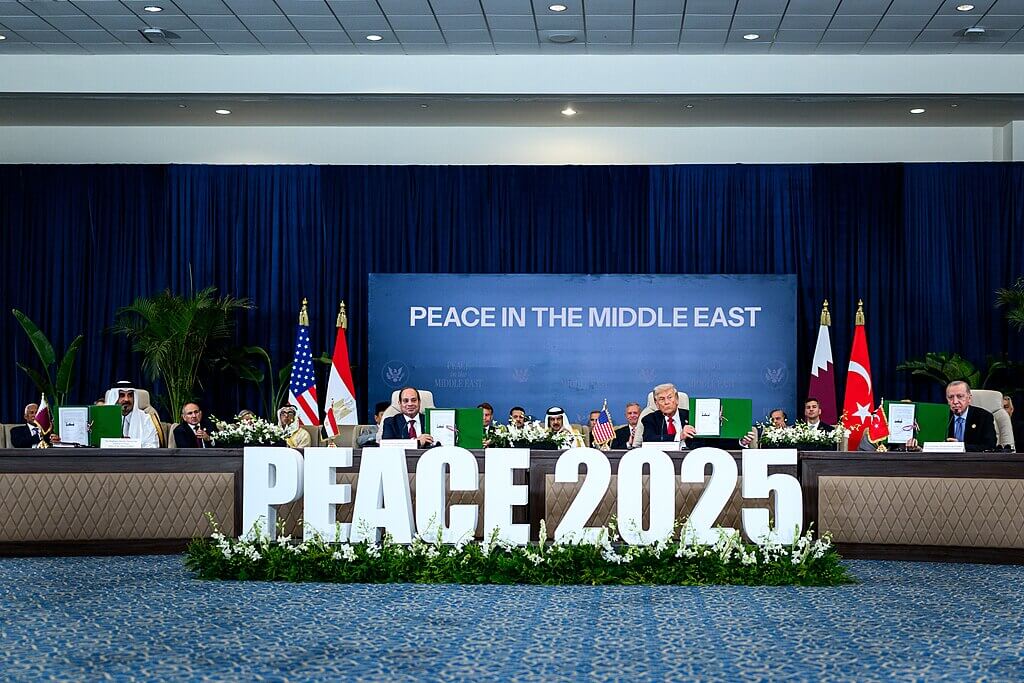Editor’s Note: While the Stimson Center rarely publishes anonymous work, the author of this commentary is a Tehran-based analyst who has requested anonymity out of legitimate concern for their personal safety. The writer is known to appropriate staff, has a track record of reliable analysis, and is in a position to provide an otherwise unavailable perspective.
By Barbara Slavin, Distinguished Fellow, Middle East Perspectives Project
The Gaza ceasefire of October 2025, brokered under intense international pressure and spearheaded by U.S. President Donald Trump, could also have major implications for Iran, providing another opportunity for Tehran — after failed talks with the U.S. and a 12-day war with Israel — to pivot from ideological commitments to pragmatic diplomacy.
The fragile agreement between Israel and Hamas, involving a ceasefire, prisoner exchanges, partial Israeli withdrawal from Gaza, and eventual reconstruction of the destroyed enclave, could reshape regional dynamics, challenging Iran’s long-standing anti-Israel stance and its hard-liner-driven foreign policy.
The accord emerged from the failure of both Hamas and Israel to achieve maximalist goals following the October 7, 2023, attacks by Hamas on Israel and Israel’s subsequent military campaign. Hamas sought a regional uprising to upset the US-led Abraham Accords and force the region to prioritize Palestinian rights, while the government of Israeli Prime Minister Benjamin Netanyahu aimed to eradicate Hamas, heavily damage the group’s regional allies, and stay in power. The Iran-backed “Axis of Resistance” suffered heavy blows, but Hamas has not been destroyed, while Israel has been compelled by domestic and international pressure to stop fighting a war that has led to the deaths of approximately 70,000 Palestinians and reduced much of the Gaza Strip’s vital infrastructure to rubble.
The ceasefire, assuming it lasts, could have profound implications for Iran, a key supporter of Hamas and Iran-backed militant groups, which has made opposition to Israel a pillar of its foreign policy for 46 years. The Iranian government initially welcomed the agreement, saying that “Tehran supports any initiative that stops the genocide, ensures the complete withdrawal of the occupying forces, and enables humanitarian aid.” However, Iran also expressed its view that Israel was likely to violate the deal.
Trump welcomed Iran’s remarks and Egypt included Iran in an invitation to a summit with Trump on Monday — an offer Iran turned down. Trump left the door open for new talks with Iran despite the plummet in relations after Israel’s summer attacks on Iran’s nuclear program, which the U.S. joined, and the European “snapback” of UN sanctions on the country in September.
Statements from other global leaders like Russian President Vladimir Putin, alongside Iranian media, suggest that the Gaza ceasefire may make it easier for Iran to resume talks with the U.S. without a perceived loss of face. Speaking at a Russia-Central Asia summit in Tajikistan on October 9, Putin stated that Israel had told Moscow that it wants to avoid a new military confrontation with Iran and now favors a diplomatic resolution of the nuclear issue. Putin relayed these assurances to Tehran and noted Iran’s commitment to mutually acceptable solutions, including renewed cooperation with the International Atomic Energy Agency (IAEA), which Iran broke off after the UN sanctions snapback. Putin’s involvement aligns with Russia’s broader stated strategy of stabilizing the region and countering Western influence.
This convergence of Russian mediation and new U.S. overtures suggests that Iran could use Putin as an intermediary. However, Iran’s internal landscape complicates this opportunity. Hard-line fundamentalists continue to view negotiations with the West as a betrayal of the Islamic Republic’s anti-imperialist ethos. Hamas’ conditional acceptance of the Trump peace plan has shocked this faction. Aligned media outlets have criticized the accord with headlines like “The Plan to Seize Gaza Under the Guise of a Ceasefire!”, urging continued resistance despite urgent humanitarian needs in Gaza. However, Ali Akbar Velayati, a former foreign minister and current advisor to Iran’s Supreme Leader Ayatollah Ali Khamenei, suggested on social media that “the beginning of the ceasefire in Gaza” may lead to a broader peace across the Middle East.
If the accord survives its initial stages, Iranian hard-liners could face a stark choice: support the peace agreement, redefining Iran’s regional role, or oppose it, risking alienation from Palestinian allies and even more diminished regional influence.
A prolonged peace in Gaza offers Iran a historic opportunity to recalibrate its relations with the U.S. and the West, potentially ending decades of proxy conflicts and nuclear tensions. Iran’s support for militant anti-Israel groups has long been cited as the main reason for Iran’s isolation and Western sanctions. There is a possibility that Trump could resume talks with Iran that trade nuclear curbs and regional de-escalation for sanctions relief and foreign investment.
Yet, significant hurdles remain. Critics highlight the accord’s fragility, its vague promises of Palestinian autonomy, reliance on as yet unnamed international forces, and uncertain Gulf-funded reconstruction. While Iranian hardliners view rapprochement with the West as a betrayal, Israel’s right wing might refocus on Iran as a threat, and the U.S. could demand concessions that Tehran deems unacceptable.
Iran’s missile program, human rights record, and regional militias remain sticking points even if an agreement can be reached on an acceptable scope for its nuclear program. Another failure risks even more isolation, empowering hard-liners and perpetuating conflict. Internally, Iran’s leadership must bridge divides between pragmatists prioritizing national welfare and hard-liners clinging to revolutionary ideals.
In conclusion, the Gaza peace accord signals a potential paradigm shift. It challenges Iran to choose between ideological entrenchment and diplomatic reintegration. Embracing pragmatism could redefine Iran’s global role, ease tensions, and promote economic recovery. As one foreign affairs analyst noted in a recent interview, “God willing, this opportunity is not lost.”
